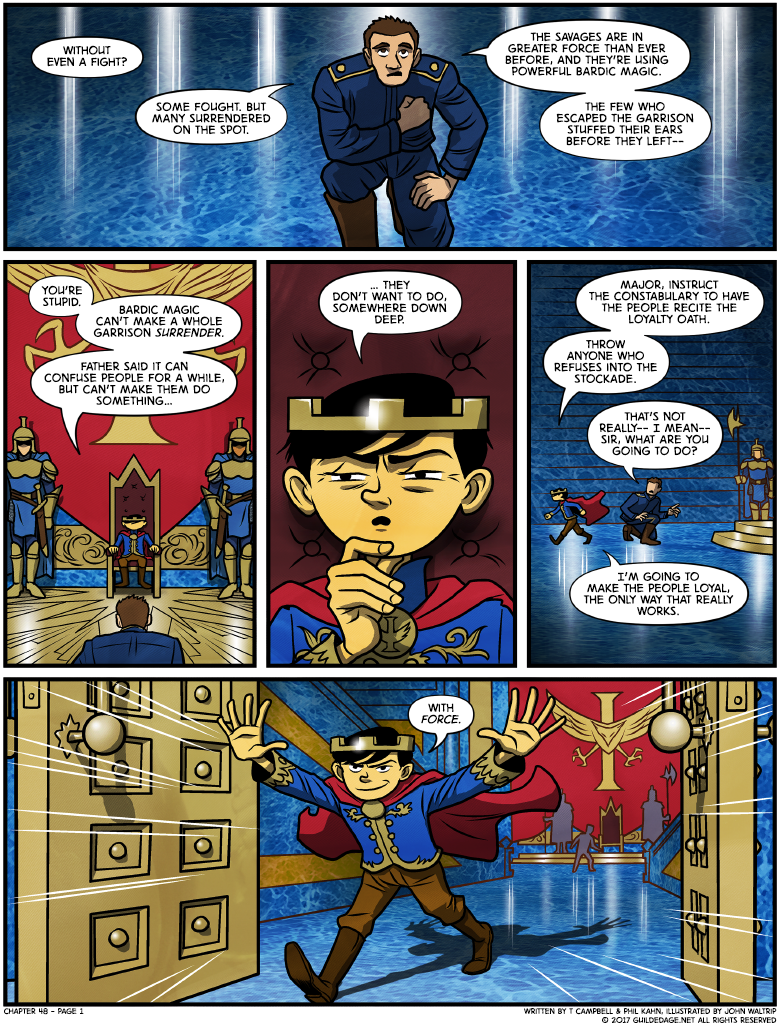Annotated 48-1
 From the original description of panel 2: Taro looks down at the major from a seat on high with compassion and understandi—HAHA JUST KIDDING, Taro looks down at the major like he can’t believe carpet stains have learned how to talk.
From the original description of panel 2: Taro looks down at the major from a seat on high with compassion and understandi—HAHA JUST KIDDING, Taro looks down at the major like he can’t believe carpet stains have learned how to talk.
Taro: smart enough to realize that some Iwatanians are surrendering because deep down, they want to. Not smart enough—or emotionally intelligent enough—to use any method of enforcing loyalty that doesn’t also enable his own bullying. (Also: not patient enough to care that the major has no real authority over the police.)
You all caught the echo, right?
FB:
Tell me who you loyal to
Is it love for the streets when the lights get dark?
Is it unconditional when the ‘Rari don’t start?











I don’t want to be the Devil’s advocate (certainly not for this devil, at least) but even the smartest person cannot use information he does not possess. As far as I can tell, Taro never had a role model that accomplished his or her goals humanely. Granted, Taro is a narcisistic sociopath, but even a heathier person woudn’t know how to act normal if someone didn’t teach that person how.
Humanely, no, but his dad at least had a good grasp of applied psychology. I don’t care enough to check, but there might even be an example in the archives where we see him attempt to bestow upon Taro some wisdom about how overt force often leads to long-term problems and should be used sparingly as a problem-solving method.
I’m pretty sure there’s nothing like that. Instead there are examples of Iwatani Senior bestowing on Taro the wisdom “the whole idea of giving up power is insanity,” “family members who suggest such things should be poisoned and gloated over,” and “in fact you should murderously take power from them when you can whether they start babbling about peace like a lunatic in their last few minutes of life or not.”
Iwatani may have expected (and probably did expect) Taro to automatically understand “we have loyalty to EACH OTHER, only everyone outside the family is prey for a reason I don’t need to articulate because of course everyone feels this way,” but Taro is actualizing every word his father ever said to him out loud.
But what are we supposed to do with that information?
Being emotionally stunted, or afflicted with Affluenza, doesn’t seem to so much excuse his behavior, as it underscores that he will continue along that trajectory until forcibly stopped.
I don’t think Mogo was trying to *justify* anything rather than *explain* it. We shouldn’t be surprised by Taro’s course of action here because even on a good day, even in relation to people he actually likes, he wouldn’t know any better.
Why the distinction matters: Somebody who doesn’t know better is no less of a villain, but a villain who may eventually see the light (however narrow the range of circumstances would need to be).
That said: I’d not give Taro much benefit here, given that Iwatani managed to get pretty far, fairly often, by complimenting people to where he wanted them, and being polite. Taro *could* have also used that strategy now and again, but he doesn’t. Iwatani sr. must have occasionally tried to teach Taro about being subtle and patient, and creating win-win situations for the people around him, but Taro does not seem interested. This means that we can’t lay all the blame for Taro at the feet of his father. Taro is pretty monstrous in his own right, too.
I interpret it as Taro being underdeveloped – just too young. With more time and attention from his father, I’m sure he would have matured into another charming, diplomatic backstabber. A long-term plotter. He’s still a horrid little monster, but philosophically I wouldn’t “try him as an adult”. Of course, trial is not on the table here – tragically he must be stopped, as he says, “with force”.
I meant to add: The takeaway for me is not that *Taro* is bad, but that despotic monarchies are. In some ways the timeline is accelerated here, but Gastonia was doomed to such tyranny sooner or later. It was just a question of how many generations it would take. Perhaps Taro’s deadly impulsiveness saved lives in the long run by collapsing the Gastonian Empire. (the former oligarchy was deeply unjust, but the Iwatani Empire likely would have been much worse, even under Taro’s father)
I don’t follow.
Yes, monarchies tend to spectacularly fail whenever a particularly psychopathic heir comes along.
But that does sort of hing on Taro being, in fact and deed, bad.
He’s a bad person, and will likely never learn.
I think the point Rolan7 was trying to make is that monarchies produce bad people as rulers eventually. Power corrupts, etc, etc.
That’s all kind of overlooking the fact that until Iwatani Sr. executed his coup Gastonia was not a monarchy, but rather an oligarchy. In fact, I don’t even think Iwatani Sr. had finished consolidating his power to the point where Iwatania can actually carry on as a monarchy before Taro murdered him. If Iwatania actually managed to win the war, Taro would probably be murdered in his sleep within a week as soon as their common enemy was gone.
Making people loyal through force? Yeah, that really really works, always have worked in the history of everywhere it’s been tried. Why, we even have a particularly noteworthy example that has been happening over the last 200 or so days…
Hasn’t kept people from using it as if it was a robust, tried and tested method, hasn’t it?
Case in point: https://angryflower.com/bombso.html
A grim classic!
Nice job with the art! I appreciate how Taro mirrors the emblem on the flag (and yes, it’s even clearer in his shadow).
Thank you!